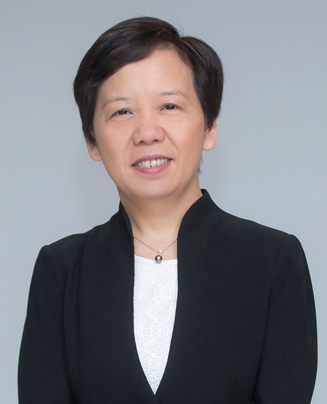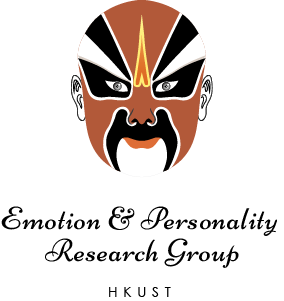BIOGRAPHY

Since Michelle received her PhD degree from the University of British Columbia, she never stops working on emotion and personality. In 2002, she joined the Hong Kong University of Science and Technology where she served as the founding director of the Undergraduate Research Opportunities Program during 2009-2016, as the acting head of Division of Social Science during 2011-2013, and as the director of Undergraduate Recruitment and Admissions during 2016-2020.
At HKUST, Michelle teaches Psychology of Personal Growth, Personality Psychology, Leveraging Personality in the Workplace, Growing Up the Chinese Way, and Seminar on Emotion. She also offers Big Five Personality Workshop. The personal growth course provides ample opportunity to satisfy her “id” impulses of performing in front of 400 students. The other courses provide a platform on which to utilize her research to enrich students’ understanding of human behaviors in comparative perspective. In 2007, Michelle won the Humanities and Social Science Teaching Award; in 2010, she became the medalist for the Michael G. Gale Medal for Distinguished Teaching; and in 2011, she was the finalist for the University Grants Committee Teaching Award. Michelle is currently taking part in two MOOC courses and they are Psychology of Personal Growth and My Favorite Lectures @ HKUST.
Michelle is happily married to Steven and they have two children. While Stephanie was a UBC baby who walked Michelle through long days of completing a multi-cultural study on the structure of emotion resulting in a 300-page dissertation, Christopher was a HKUST baby who challenged her to strike a balance between the “stress and tension” of the tenure pursuit and a family energized by a newborn. Both children are grown-ups now, as they claim, allowing Michelle to live out her childhood dreams.
RESEARCH INTERESTS
Curriculum Vitae | Google Scholar
Michelle’s research centers on emotion and personality. Currently, she is exploring three crucial areas of human experience: the nature of emotion, the relationship between personality and language, and the interface between large language models (LLMs) and mental health.
Her first line of research concerns the development of a circumplex model in the English and Chinese languages to describe emotion. Recently, she collaborated with researchers from 33 communities covering 25 languages to examine the structure of emotion and its relationship with personality and psychological well-being. This study sought to extend emotion research beyond Western, educated, industrialized, rich, and democratic (WEIRD) societies. Fueled by the initial success in cross-cultural teamwork and her passion for using an interdisciplinary approach to study emotion, she is currently editing the Oxford Handbook of Emotion and Culture.
Her second line of research explores the role of language in personality. Do bilingual individuals have two distinct personalities? Her initial findings show that when responding in Chinese (as opposed to English), Chinese bilinguals saw themselves as more neurotic, agreeable, and conscientious. What is primed by the test language? Why does using Chinese lead to a perception of increased neuroticism? Cultural values and reference groups are possible factors accounting for the language effect. She is currently designing studies to test their influences.
Her third line of research is a spin-off from her work on sentiment analysis of social media data. It examines whether LLMs can enhance researchers’ understanding of users’ emotions. How valid are LLM-assessed emotions? Are they related to life outcomes such as mental wellness? Answering these questions is an essential step toward developing AI systems that accurately understand human emotions.
REPRESENTATIVE PUBLICATIONS
- Yik, M. (Ed.). (in press). The Oxford Handbook of Emotion and Culture.
- Götz, F. M., & Yik, M. (2025). Personality science around the world [Editorial]. Personality Science, 6.

- Yik, M. (2024). Hello, Neihou: Anchoring and adjustment in personality assessment. Personality Science, 5.

- Yik, M., Russell, J. A., & Steiger, J. H. (2011). A 12-point circumplex structure of core affect. Emotion, 11, 705-731.

- Yik, M., (2010). How unique is Chinese emotion? In M. H. Bond (Ed.), The Oxford handbook of Chinese psychology (2nd ed., pp. 205-220). Hong Kong: Oxford University Press.

- Yik, M. (2010). Affect and interpersonal behaviors: Where do the circumplexes meet? Journal of Research in Personality, 44, 721-728.

- Yik, M. (2009). Studying affect among the Chinese: The circular way. Journal of Personality Assessment, 91, 416-428.

- Yik, M. (2007). Culture, gender, and the bipolarity of momentary affect. Cognition and Emotion, 21, 664-680.

- Yik, M., & Russell, J. A. (2004). On the relationship between circumplexes: Affect and Wiggins’ IAS. Multivariate Behavioral Research, 39, 203-230.

- Yik, M., Russell, J. A., Ahn, C.-K., Fernández Dols, J. M., & Suzuki, N. (2002). Relating the five-factor model of personality to a circumplex model of affect: A five language study. In R. R. McCrae & J. Allik (Eds.), The five-factor model of personality across cultures (pp. 79-104). New York: Kluwer Academic/Plenum Publishers.

- Yik, M., Bond, M. H., & Paulhus, D. L. (1998). Do Chinese self-enhance or self-efface? It’s a matter of domain. Personality and Social Psychology Bulletin, 24, 399-406.

CONTACT
Michelle YIK
The Hong Kong University of Science and Technology
Division of Social Science
Clear Water Bay, Kowloon
HONG KONG
Email: Michelle.Yik@ust.hk



